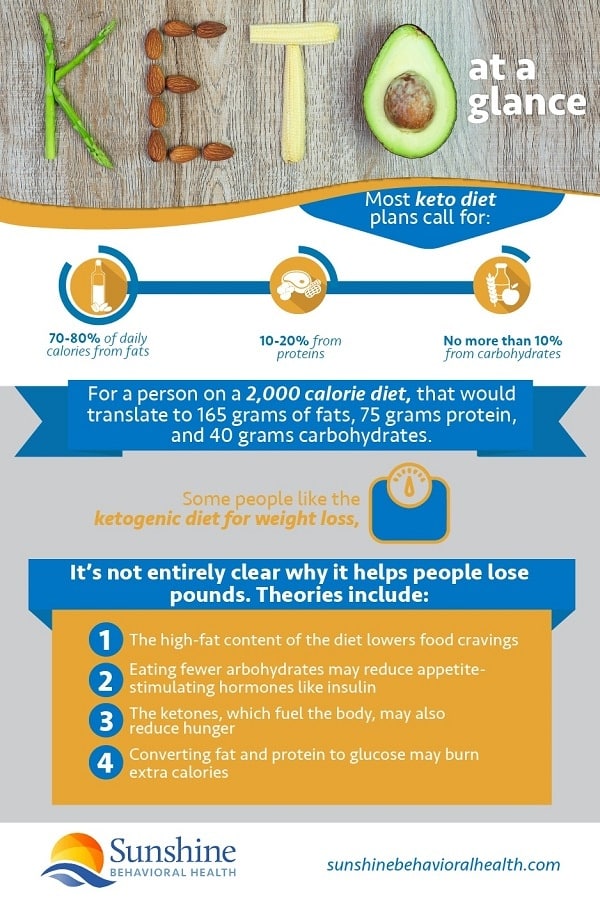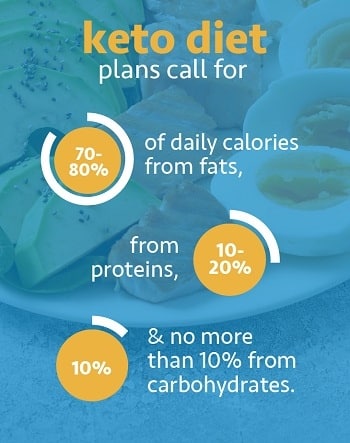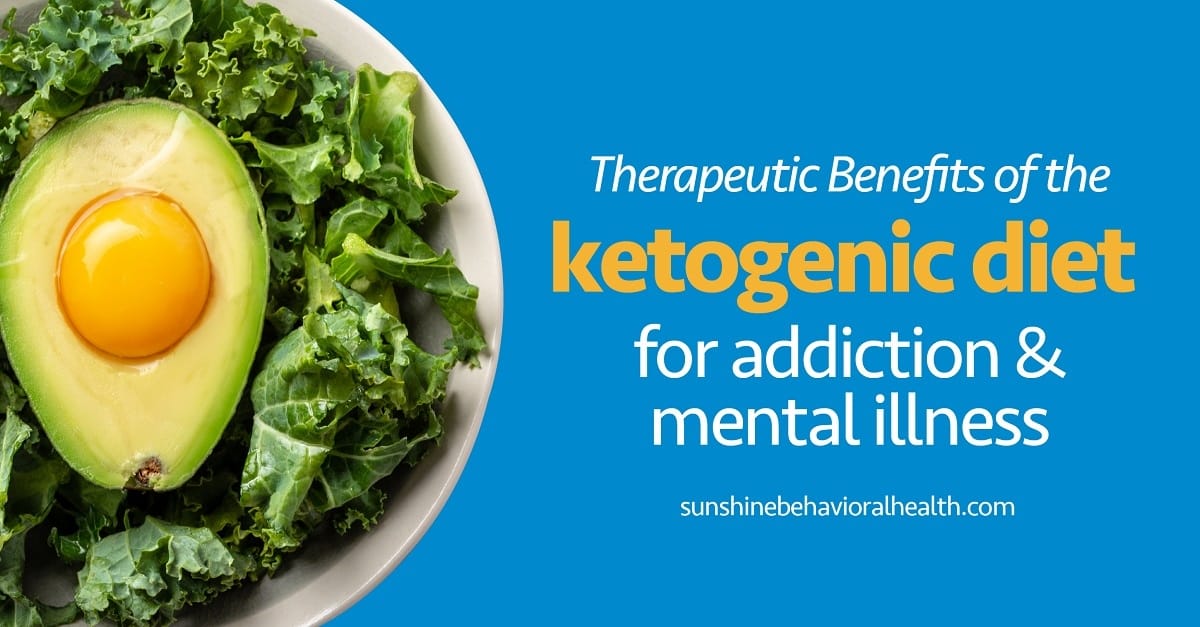Whether one’s mental health and addiction issues have been noticeably impacted by the quarantine, or are an ongoing problem, chances are they’re continually looking for new tools to deal with these challenges. Lifestyle changes such as more exercise and reducing junk food are always a good idea. But can specific eating plans like the ketogenic diet be an even bigger help?
What is the Ketogenic Diet?
The ketogenic diet is designed to cause the body to produce fuel by burning fat instead of carbohydrates. In order to reach the state of ketosis, people need to eat higher amounts of fats and lower amounts of carbohydrates.
For years, the ketogenic, or “keto” diet was more familiar to parents of epileptic children than to the general population. The eating plan produces a rise in ketones in the bloodstream, which doctors discovered were useful in reducing the number of seizures patients endured.
Normally, the typical diet results in the body using glucose from carbohydrate-rich foods (breads, cereals, pasta, fruits, and other starchy or sweet foods) for fuel. The keto diet short-circuits that tendency to use glucose for energy by severely reducing carb intake. Once that happens, the liver eventually uses fat as the energy source, rather than glucose.

Can a Keto Diet Help Mental Health and Addiction?
While keto’s impact on controlling seizures has been studied for decades, its implications for other neurological conditions have just begun. So while whether it’s helpful for problems like depression are currently limited to anecdotal evidence and animal studies, the research appears promising.
One reason the keto diet has been posited as potentially helpful for mental health and associated issues is centered around the ketone bodies that pass into the brain as a result of going into ketosis. After being credited with reducing epilepsy seizures, scientists began investigating whether other neurological disorders might be helped by the ketogenic diet. Some people with anxiety and depression, along with sleep disorders, may be helped by this type of eating plan. That also may apply to people on the autism spectrum or with attention-deficit hyperactivity disorder (ADHD) struggles.
One study found that a ketogenic diet reduced alcohol withdrawal symptoms among rats. It’s only one study, but the results are intriguing, especially when considering how painful (and sometimes potentially deadly) detoxing from alcohol can be. Another study found that a keto diet made rats less responsive to cocaine.
It’s important to remember, however, that studies are still ongoing about how effective ketogenic diets are for various neurological and behavioral issues.
It’s also worth noting that many people who switch to keto diets experience what’s been dubbed “keto flu” or “carb flu.” As the body adapts, some people may have withdrawal-type symptoms — those include nausea, vomiting, sugar cravings, poor concentration, weakness — that last for about a week. So if even after the adjustment period one finds that keto isn’t having the effect one hoped for, or has actually made them feel worse, that’s not necessarily the mark of failure.
Diet is often just one component of improved mental health, however. In addition, there are several other nutritional programs to try if keto isn’t having a good effect — even if it’s just cutting back on takeout and soda.
Understanding the Mental Health/Addiction Link
Up to 10% of American adults are likely to experience some form of addiction in their lifetime, according to the National Institutes of Health. Sadly, about three-quarters of those people never seek treatment.
Substance use disorder can run the gamut from alcohol and tobacco to marijuana, amphetamines, sedatives, heroin, and other opioids, along with others. Although some of these are initially taken as prescription drugs, these treatments for physical pain or psychological issues can eventually become addictions.
It can be hard to predict why one person can drink recreationally or take pain pills without experiencing addiction, while another person might quickly become dependent. It’s believed that factors such as genetics, background, and early exposure can make a difference.
Mental health issues are increasingly becoming cited as yet another potential factor that influences whether someone will suffer from addiction. When two problems, such as depression and addiction, occur together, it is known as comorbidity, or dual diagnosis. For example, about 45% of the people in the criminal justice system for substance use disorder violations have been found to have an accompanying mental health problem.
Addiction and problems such as depression or anxiety tend to feed on one another. People often turn to potentially addictive substances as a form of self-medication to feel less down or less nervous. Yet all too often, those bad habits lead to mood swings or even bigger problems in their lives.
For these reasons, some may find a ketogenic diet has an elevating, calming effect, so it’s possible that it can also be one of many tools used to fight substance use disorder. (It’s always a good idea to discuss changes like these with one’s medical and treatment team first.)
Keto Diet for Mental Health
One may find that switching to a ketogenic diet improves their mental health in general, which can also bolster resistance to addiction issues. (That may in part be what helped the rats in the alcohol withdrawal and cocaine use studies.) For these reasons, any lifestyle changes made to better one’s mental well-being may have implications beyond improved moods.
The neurotransmitter gamma-aminobutyric acid, or GABA, helps promote a feeling of calmness by blocking the brain transmitters that set off a negative nervous system response. In layman’s terms, that means that anything one can do to increase GABA production may help with depression and anxiety. The state of ketosis is one of the factors that may cause additional production of GABA neurotransmitters.
The production of ketones that are created when the body burns more fat may also help improve brain function. And for many people, the lifting of that “brain fog” can be the key to feeling better mentally, as well as decreasing the impulse to turn to addictive substances or habits.
Of course, mental health and addiction issues are complex ones that should be discussed with one’s medical team. Often, talk therapy and medication are important parts of treatment. But while a ketogenic diet alone may not be enough to treat one’s issues, it may help.
The Basis of Ketosis
Most American diets are rich in carbohydrates. Often, even the healthiest eaters who stick to whole grains get about half of their calories from carb sources. For many people, using high-fiber grains and fruits instead of foods made with white sugar and flour is enough, because the fiber slows the breakdown of these foods into glucose. In turn, spikes in blood sugar are avoided.
Often, simply improving the quality of carbohydrate intake can be the key for people struggling with diabetes, heart disease, digestive issues, or weight gain.
But for others, reducing carb intake drastically in favor of healthy fats and proteins — hallmarks of the keto diet — may yield better results than one that simply incorporates better-quality carbs.
The main difference? Once people have been on the keto diet for a few weeks, their bodies are regularly burning fat for fuel, rather than carbohydrates.
Why Does it Take Longer to Feel Results?
One may start to have fewer mood swings with the ketogenic diet right away because they won’t be having the sugar “highs” and crashes that come with foods like donuts and soda.
But in general, the keto diet takes longer to yield lasting results. A person would need to reach the state of ketosis for that effect, which can take as long as four weeks, according to the Cleveland Clinic. This time frame applies whether one is trying to control blood sugar, lose weight or feel better mentally. Only when one’s body goes into ketosis will the fat-burning component of the process kick in.
Starting the Keto Diet
 The basics of a keto diet consist of low carbs, higher amounts of healthy fats and proteins, and plenty of vitamins and minerals from non-starchy fruits and vegetables.
The basics of a keto diet consist of low carbs, higher amounts of healthy fats and proteins, and plenty of vitamins and minerals from non-starchy fruits and vegetables.
Depending on the keto diet plan one chooses — or which one someone devises for themself — the carb count will be somewhere between 20 grams to 50 grams a day. Even 50 grams will likely be less than what most people are used to, given that it equals about one bagel. Some keto diets start with almost no carbs in order to get one to ketosis more quickly, but then allow them to go up to about 40 to 50 grams a day once they’ve reached ketosis. Oatmeal in the morning and brown rice with lunch or dinner would yield about 40 to 45 grams of carbs for the day, to give an example of a “maintenance” keto plan.
Because a keto diet should be high in fats, some people eat from protein-rich, high-fat foods like bacon, eggs, and cheese. But unless entering ketosis counters any cholesterol concerns, healthier fats and proteins are the better option. These include fatty fish like salmon and sardines, avocado oil, olive oil, nuts and seeds, with moderate amounts of saturated fats. Because many high-fat foods are also high in protein, it’s relatively easy to get the majority of one’s daily calories from both of these food groups at the same time after reducing carbs.
Of course, water and non-starchy vegetables are also important for giving the hydration and nutrients one needs. Fresh greens and cooking greens such as lettuce, kale, and spinach are great choices for vitamins and minerals, as are peppers, asparagus, and mushrooms. In addition, it’s advised to aim for at least six glasses of water a day.
What does this look like in practice? According to the Harvard School for Public Health, most keto diet plans call for 70-80% of daily calories from fats, 10-20% from proteins, and no more than 10% from carbohydrates. For a person on a 2,000-calorie diet, that would translate to 165 grams of fats, 75 grams protein, and 40 grams carbohydrates each day.
In the beginning, it can be hard to calculate exactly how many grams of various nutrients one is consuming. Food labels are enormously helpful here, as long as one makes sure they pay attention to the serving amount. (A person can always multiply or divide if they’re not planning to use the exact amount on the label.) It’s just good to keep in mind that nuts or nut butter, for example, will have significant amounts of both fats and proteins. Foods like peanut butter with added sugar, will also contribute some carbs.
Don’t Ignore Warning Signs
Every person is different, so a diet that improves the physical and mental health of one person might have the opposite effect on another. Alternatively, an eating plan that might have a beneficial impact for a long period can eventually stop yielding those positive results.
It’s worth noting that people with pre-existing health conditions like diabetes should be extra cautious about a keto-friendly diet. Before making any drastic change, diabetic or not, in fact, consulting with a doctor is generally advised.
While some keto side effects are normal, especially at first (fruity-smelling breath, reduced appetite, that early “keto flu”), check with your doctor if you’re having any of these warning signs:
- Fatigue
- Irritability
- Headaches
- Kidney stones
- Liver issues
- Constipation, nausea, or diarrhea
- Symptoms indicative of vitamin deficiency
In some cases, you may simply need to adjust the foods you’re choosing within your keto diet. Your medical team can run tests — ideally, regular checkups will be part of the diet plan — to determine if your cholesterol count has increased, for example. That would indicate that the state of ketosis hasn’t prevented the effect that saturated fats have on most people, and that you may need to have fewer pieces of bacon and more helpings of fatty fish.
Of course, negative symptoms might indicate that you haven’t actually entered or maintained the state of ketosis. But it’s also possible that another nutritional approach would simply be a better choice. Information about dietary changes such as the ketogenic diet, as well as mental health and recovery resources, can be found below:
Finding the Support You Need
Sources
Medical disclaimer:
Sunshine Behavioral Health strives to help people who are facing substance abuse, addiction, mental health disorders, or a combination of these conditions. It does this by providing compassionate care and evidence-based content that addresses health, treatment, and recovery.
Licensed medical professionals review material we publish on our site. The material is not a substitute for qualified medical diagnoses, treatment, or advice. It should not be used to replace the suggestions of your personal physician or other health care professionals.






